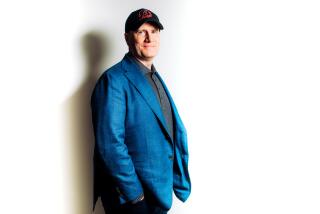Universal Theme Parks Come With a Twist: Spielberg Rider
Universal Studios theme parks are known for jaw-dropping experiences.
But prospective buyers of the operation have encountered one spectacle that hasnât been widely advertised: an extraordinarily lucrative deal for director Steven Spielberg.
According to several executives with knowledge of the 1980s-era arrangement, Spielberg gets an unusually rich cut of receipts from some park operations in return for acting as a consultant to the unit.
The director collects 2% of the gross -- from tickets to concession sales -- from Universalâs two parks in Orlando, Fla., sources said.
He also gets a piece of Universal Studios Japan, the sources said, with terms more complicated because of that parkâs complex ownership structure with investors and the city of Osaka. He doesnât share in Universal Studios Hollywood, they added, because that park predates his deal, nor in a Spanish theme park in which Universal is a major partner.
What makes the arrangement even more of a whopper is that it continues in perpetuity, meaning generations of Spielbergs to come could share in the riches.
A spokesman for Spielberg, 56, said the director doesnât comment on his deals.
Because of the pactâs complexity, and because Universal doesnât break out financials for individual theme parks in its parks and resorts unit -- which overall has revenue of about $900 million a year -- Spielbergâs interest is difficult to value. But some former Universal executives say it could be worth hundreds of millions of dollars over time.
Even without the theme park revenue, Spielberg is one of Hollywoodâs richest individuals. The most recent Forbes 400 pegs his net worth at $2.2 billion.
Spielbergâs profitable consulting contract was quietly negotiated during the regime of Lew Wasserman and Sidney Sheinberg, who ran Universalâs then-parent MCA Inc. until 1995, when Seagram Co. bought the company.
In an interview, Sheinberg declined to go into detail about the deal, but he termed it an appropriate reward for the directorâs creative role in helping shape Universalâs theme parks.
âHe was hardly a passive participant,â said Sheinberg, who now is a producer.
The two MCA executives gave Spielberg his break when he was a fledgling filmmaker in the late 1960s and early 1970s. The director rewarded them by becoming Universalâs most important creative asset, directing such Universal blockbusters as âJurassic Park,â âJawsâ and âE.T. the Extra-Terrestrial,â many of which spawned theme park attractions for the company.
Spielbergâs influence goes well beyond attractions tied to films he directed.
Films produced but not directed by Spielberg also have been turned into popular Universal attractions, including âMen in Black,â âBack to the Futureâ and âTwister.â And one of Universalâs most heavily promoted attractions is the new Shrek 4-D based on the blockbuster animated film from the DreamWorks SKG studio that Spielberg formed with fellow moguls David Geffen and Jeffrey Katzenberg.
Universalâs theme parks are part of the package of entertainment assets put up for sale by struggling Vivendi Universal, which Monday received a first round of bids from suitors.
The prospective buyers of the assets declined to comment on Spielbergâs arrangement, though some executives involved in bids privately said they were vaguely familiar with it and saw no reason it would threaten a purchase.
Investment company Blackstone Group, which already owns half of Universalâs Florida operations and presumably is familiar with Spielbergâs contract, has been seeking to buy the theme parks.
A spokesman for Blackstone declined to comment on Spielbergâs deal.
In any case, itâs not unprecedented in Hollywood for an individual to have a piece of a theme park: The late Walt Disney owned the monorail and steam railroad at Disneyland through a company he personally formed.
More to Read
The biggest entertainment stories
Get our big stories about Hollywood, film, television, music, arts, culture and more right in your inbox as soon as they publish.
You may occasionally receive promotional content from the Los Angeles Times.










